eBay Appeals Cyberstalking Punitive Damages Ruling, Seeks To Cut $466M From Potential Payout
UPDATE 1-16-25
Judge Patti Saris has rendered her decision, denying eBay's motion seeking to appeal her previous ruling allowing some claims for punitive damages to move forward in the cyberstalking lawsuit.
The ruling soundly rejects eBay's arguments that there were "substantial grounds for difference of opinion" over the Court’s holding that California law governs the Steiners' request for punitive damages and that allowing an appeal of the decision at this time would help move some or all claims toward settlement to avoid trial.
A substantial ground for difference of opinion is satisfied when the issue presents “difficult and pivotal questions of law not settled by controlling authority.”...
...A party’s mere disagreement with a court’s ruling or its application of law to a specific set of facts is insufficient...Accordingly, eBay fails to show a substantial ground for difference of opinion.
But the real donnybrook is that this appeal will not advance the ultimate termination of this aged litigation. The suit was filed on July 21, 2021. Multiple motions for summary judgment remain pending, and the Court has yet to determine which issues will be resolved as a matter of law...
Defendants claim that an interlocutory appeal will facilitate settlement with eBay, particularly if the ruling eliminates the possibility of punitive damages. Currently, Plaintiffs are seeking an eye-popping request in punitive damages.
While the prospect of limiting damages might promote settlement, the timeline for an interlocutory appeal -- likely exceeding one year -- renders this argument unpersuasive.
By the time such an appeal is resolved, any trial would likely be over, and a full appeal on a full record could go forward thereafter. For the foregoing reasons, the Court DENIES the Motion to Certify Interlocutory Appeal
That leaves the door open for the Steiners to continue pursuing their $700 Million total claimed damages detailed below as the lawsuit continues on a path toward a 2025 trial.
UPDATE 12-11-24
The plaintiffs, Ina and David Steiner, have responded to eBay's motion seeking to appeal ruling allowing some claims for punitive damages to move forward in the cyberstalking lawsuit.
The strong response criticizes eBay for what the Steiners' attorneys call duplicity, false statements, and playing the victim, saying if eBay was as committed to reaching a fair settlement as they claim to be, all they need to do is pick up the phone.
Defendant’s motion is most revealing for what it does not say. Despite asking that the Court address and decide the applicability of punitive damages to some of Plaintiffs’ claims, Defendant eBay now refuses to accept the well-reasoned decision of this Court...
At the July 18 conference, counsel for eBay said “[o]ur hope is that by getting this, we’re not going to have to go through a whole bunch of the other discovery.”...
In response the Court inquired “Let me say, let’s assume I say punitives do or do not apply, does that settle the case, or am I still going to have a case no matter what?”...
Counsel for eBay responded “It’s really hard to answer that, but it will go a long way towards putting the parties in a position where there’s a zone where there could be a settlement. That’s why we’re here. We’re not here to waste everybody’s time.”
Defendant’s statements to the Court have proven false as they have failed to engage in any further meaningful discussion regarding resolution. Defendant now claims that the Court’s ruling on punitive damages makes trial all but certain.
The truth of that statement lies solely within Defendant’s control.
Attempting to play the victim and curry favor with the Court, Defendant states “eBay is committed to compensating Plaintiffs fairly and appropriately for what they endured.”
Notwithstanding such representations, eBay’s actions do not match their words. It has become apparent to Plaintiffs that eBay is only prepared to compensate them “fairly and appropriately” if it is based solely upon their terms.
This Court should not be fooled by eBay’s attempt to play the victim. The only victims in this case are the Plaintiffs, and they are, have been, and continue to be prepared to honor the representations of their counsel at the July 18 conference with the Court and engage in good-faith settlement discussions with Defendant eBay and all the Defendants.
Should Defendant wish to see if the Parties can get in a “zone where there could be a settlement” all eBay needs to do is pick up the phone or return to the negotiating table.
Setting aside Defendant’s duplicity, this Court should have no trouble swiftly rejecting the motion before it...
Source:Steiner et al v. eBay Inc. et al 1:21-cv-11181 Doc 518
The court has not yet issued a ruling on the motion to allow interlocutory appeal.
eBay appeals punitive damages ruling in cyberstalking lawsuit, seeking to cut $466 million out of potential $700 million payout and ease the way for settlement negotiations to try to avoid 2025 trial.
The bizarre corporate plot unfolded in the summer of 2019, targeting Ina and Davi Steiner for their reporting on eBay at EcommerceBytes and seeking to unmask the identity of Fidomaster / unsuckEBAY, an anonymous commenter and source who also sparked the ire of top executives at the company.
Court records revealed sordid details of the harassment that included disturbing deliveries of live insects, bloody pig masks and funeral wreaths as well as threatening messages, doxxing that ultimately escalated to in-person stalking and an attempted break-in at the hands of high-level eBay security personnel.
Sr Director Security Jim Baugh, Director of Global Resiliency David Harville, Security Manager Philip Cooke, Sr Manager Special Operations Brian Gilbert, Sr Manager Global Intelligence Stephanie Popp, Global Intelligence Manager Stephanie Stockwell, and Security Analyst Veronica Zea all pleaded guilty and have been sentenced for their roles in these crimes.
eBay signed a deferred prosecution agreement with the Department of Justice that forced the company to admit to a detailed recitation of all the relevant facts involving six felony offenses with eBay paying a $3 Million fine and undergoing 3 years of enhanced compliance monitoring in order to avoid further criminal prosecution related to this matter.
But importantly, that $3 Million was paid to the US Treasury, not the victims, leaving the Steiners to pursue compensation through the civil court system.
The ongoing lawsuit names the seven criminal defendants plus eBay, ex-CEO Devin Wenig, ex-Communications Chief Steve Wymer, ex-SVP Global Operations Wendy Jones, and security company Progressive F.O.R.C.E Concepts (PFC), claiming direction and support for the harassment came from the very top of eBay's c-suite.
The Steiners are seeking $12 million in economic damages for alleged harm to their business, saying advertisers and sources stopped working with EcommerceBytes as a result of the scandal.
But they are also pursuing individual claims for intentional infliction of emotional distress, civil conspiracy, defamation, trespass, false imprisonment, and Massachusetts Civil Rights Act violations, bringing the total in combined compensatory and punitive damages sought to a stunning $700 Million.
Those claimed damages were broken out amongst the various named defendants with eBay and ring-leader Jim Baugh alleged to be the most liable at $200M each, then Harville at $150M, PFC $50M, Zea $35M, Wenig $25M, Wymer and Jones $15M each, Gilbert $3M, Cooke and Popp $2.5M each, and Stockwell at $2M.
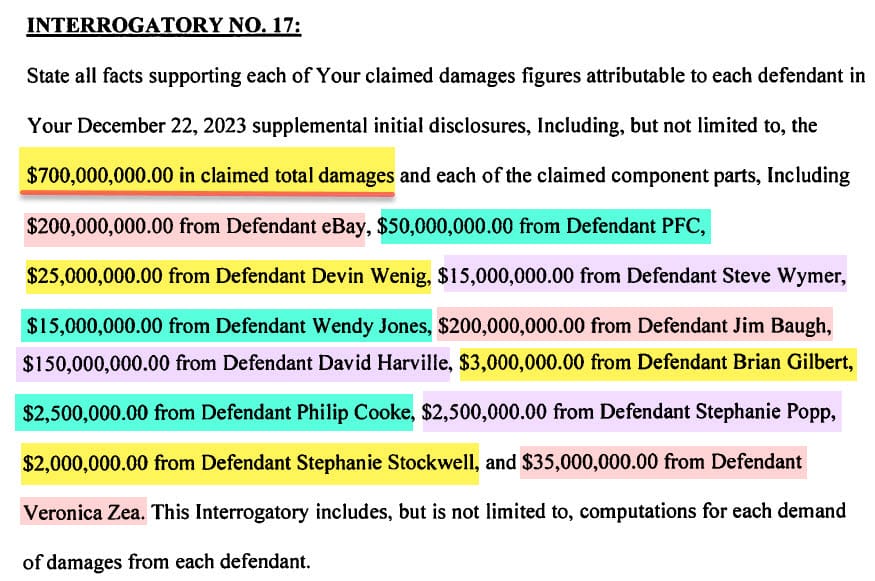
Judge Patti Saris has been strongly urging the parties to engage in mediation to work toward settling at least some of the civil claims, saying in a recent hearing "I don't see any way in which a jury could decide this with the number of defendants...I just don't have a big enough courtroom for that number and it's confusing to a jury."
She suggested if the lawsuit goes to trial at its current size and scope, it may need to be split up, with claims against eBay, the c-suite executives, and the criminal defendants tried in seperate groups in an effort to address the logistical challenges posed by such a complex case.
But all efforts at mediation so far have failed, with both parties unable to come to an agreement about the amount and types of damages that should be considered for negotiating a settlement.
The question of whether the Steiners would be able to pursue punitive damages has been cited by eBay's outside counsel as one of the major sticking points blocking the path to settling at least some claims, with eBay arguing Massachusetts law should apply, which would block punitive damages in this case.
The Steiners contend California law should apply, which would allow claims for punitive damages to move forward.
Saris issued her ruling on the matter last month, splitting the issues up by the different types of claims involved and allowing punitive damages to be pursued for some while denying them for others.
Punitive damages for defamation were not allowed, due to the fact that Craigslist ads, pornography mailed to neighbors and false Person of Interest reports supplied to the Natick Police were all determined to have primarily occurred within Massachusetts.
On the claims of trespass, false imprisonment, and Massachusetts Civil Rights Act violations, Judge Saris again ruled Massachusetts law would apply, so punitive damages would not be available for those claims either.
The Steiners' remaining claims of intentional infliction of emotional distress and civil conspiracy covered not just the physical stalking and surveillance but also a broad range of criminal conduct that was carried out online, emanating from eBay's San Jose, California headquarters.
That connection was enough for Judge Saris to rule that punitive damages for those claims can be pursued in this case, as California would have countervailing interest in deterring malicious and extreme conduct by corporations domiciled in their state.
However, with respect to the intentional infliction of emotional distress and civil conspiracy claims, California’s countervailing interest in deterring such malicious and extreme conduct by its corporate domiciles prevails since the most significant of the unlawful conduct took place within its borders.
Consequently, for these claims, the Steiners in this case rebut the general presumption that the law of the state where the injury occurs governs...
...Accordingly, given that the conspiracy to harass, intimidate, and threaten the Steiners originated in California and a substantial amount of the distressing conduct occurred there as well, California’s interest in applying punitive damages to conduct that occurred within its borders by one of its resident corporations outweighs any interest Massachusetts might have in protecting eBay “from excessive liability” for actions taken in California.
Source:Steiner et al v. eBay Inc. et al 1:21-cv-11181 Doc 506
The ruling didn't specify how much of the Steiners' $700 Million demand was for punitive vs compensatory damages, but eBay's motion to appeal the decision reveals it to be a significant portion at ~$466 million.
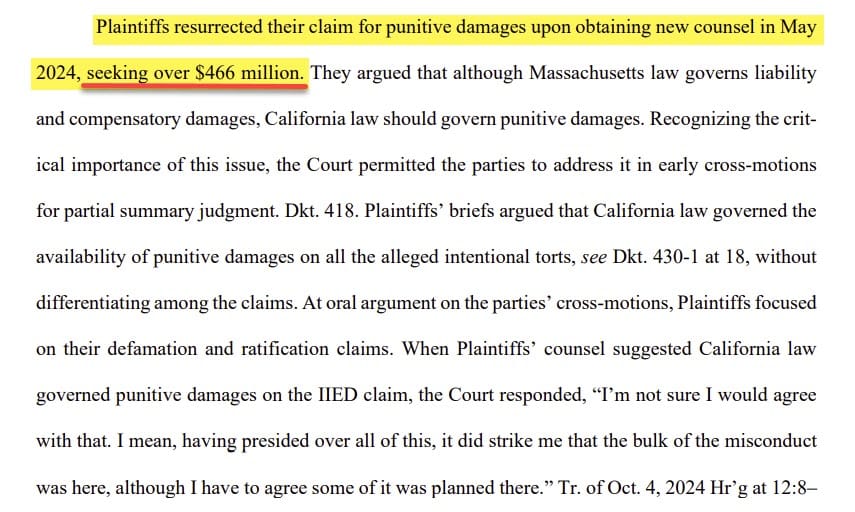
In arguing why their motion for interlocutory appeal should be granted, eBay says there is substantial ground for difference of opinion over the Court’s holding that California law governs the Steiners' request for punitive damages and that reasonable jurists could disagree with the Court’s interpretation and application of relevant case law and precedent.
Tension between the Court’s rulings in this very case underscore the reasonableness of disagreement over the Court’s Order.
In dismissing Plaintiffs’ California stalking claim, the Court held that Massachusetts law applied given the “disturbing act of surveilling and stalking” that occurred in Massachusetts, even though “online messages” were “sent from California” and that “planning and facilitating occur[red] there as well.”...
In the Order, by contrast, the Court held that the “broader range of concerted, online conduct” and planning that originated in California tipped the scales in favor of California law, despite the same “surveill[ance], stalk[ing], and tail[ing]” occurring in Massachusetts...
The tension between those opinions demonstrates that, as the Court rightly recognized, whether Massachusetts or California law applies to plaintiffs’ IIED and civil conspiracy claims is a “closer question,”...and that it is one on which reasonable jurists could reach differing conclusions.
Source: Steiner et al v. eBay Inc. et al 1:21-cv-11181 Doc 517
eBay also believes their request for appeal should be allowed because resolving the issues still in contention on the matter of punitive damages now could help either bring the case to a close through settlement or streamline and simplify the case if it should continue to trial.
As the parties’ agreement to seek an early determination of the issue recognized, the Court’s ruling on choice of law for punitive damages will heavily influence the course of this case. Courts have long recognized how the specter of punitive damages distorts settlement negotiations.
Indeed, in recognition of the fact that “resolution of the punitive damages issues may alter the direction of the case"...numerous courts have concluded that the availability of punitive damages is a proper issue for interlocutory appeal.
Given the more than $466 million in punitive damages Plaintiffs seek here, “an immediate appeal may materially advance the ultimate termination of the litigation by providing the parties with certainty as to the scope of possible financial exposure if the case were to proceed to trial, which differs greatly depending on whether California or Massachsuetts law is applied.”
Source: Steiner et al v. eBay Inc. et al 1:21-cv-11181 Doc 517
If eBay is successful in appealing this decision and getting punitive damages taken off the table, that would still leave a potential ~$234 million in play for compensatory damages.
Compensatory damages are meant to compensate victims for specific loss or injury, and typically carry a higher burden on the plaintiffs to show that the named defendants caused actual economic or physical/emotional harm and to provide evidence to bolster the dollar amounts being claimed, including detailed medical records, tax returns and other business or financial records, and expert testimony.
While the Steiners are free to claim more than $200 million in compensatory damages, if the evidence and expert witnesses don't support that amount, a jury would only be able to grant a judgement for proven economic damages but would have wider discretion for pain and suffering and emotional distress since those are harder to quantify.
On the other hand, punitive damages are designed to punish a defendant for outrageous conduct and/or to reform or deter the defendant and others from engaging in similar conduct in the future.
As such, the amount of punitive damages awarded in civil lawsuits can often be higher than compensatory damages - especially in cases of corporate wrongdoing where a jury may feel it is in the public interest to deter the defendant and other companies from continuing unethical or illegal activities.
That deterrent effect is integral to why the Steiners have pursued this case - Andrew Finkelstein, a lawyer for the Steiners at Finkelstein & Partners, told Reuters that Saris' decision to allow some claims for punitive damages to move forward was "important to the couples' efforts to stand up to such corporate activities."
"Punitive damages are intended to deter such behavior in the future, and the Steiners are pleased a jury will be able to send such a message with a money verdict."
That statement suggests the Steiners may be less amenable to a settlement than eBay's motion indicates, though that could change if eBay's appeal is successful.
The financial details of the case are made even more complicated by the fact the Steiners fired their original attorney, Rosemary Scapicchio, in May and brought in new counsel to represent them going forward.
Lawsuits like this are typically taken on contingency, meaning the lawyers agree to be paid a percentage of any eventual settlement or judgement (average of 33% according to the American Bar Association) rather than collecting upfront/ongoing fees during the course of litigation.
Contingency agreements are critical for cases like this where the plaintiffs are at a clear disadvantage going up against a multi-billion dollar corporation and wouldn't have the resources to pursue the case otherwise.
But what happens if you drop a lawyer from a contingency case after they've done 3+ years of work they haven't (yet) been paid for and move to a different firm?
Outside of extreme situations of misconduct or ethics violations, typically the original attorney would still be owed compensation for the work provided while they were counsel of record in the case and they can file a lien for fees and costs which will be required to be paid from the proceeds of any settlement or judgement - which Ms. Scapicchio has done.
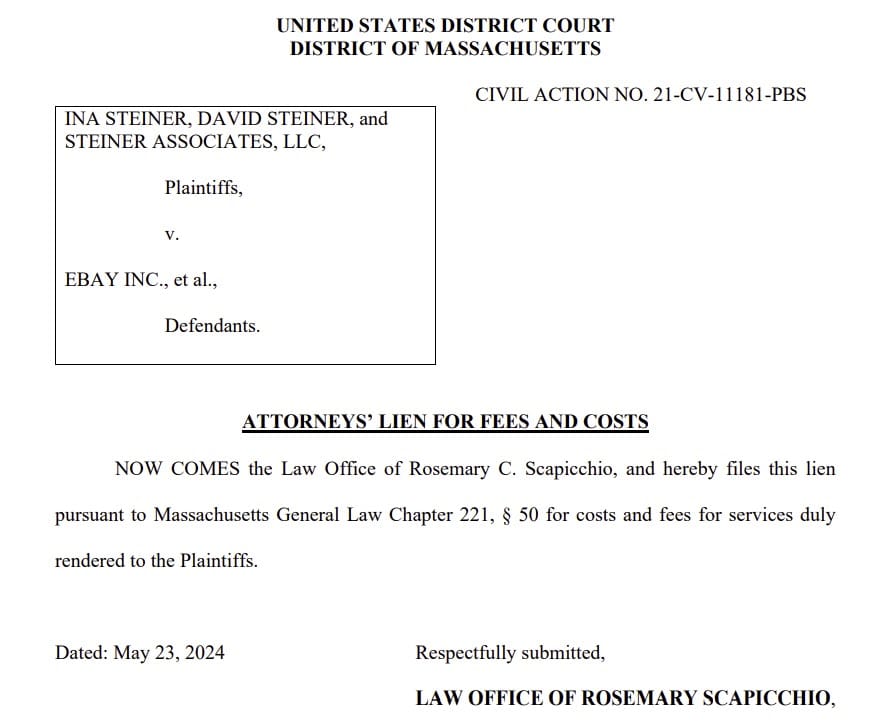
Neither the Steiners nor Ms. Scapicchio have publicly commented on the switch up in counsel, but it may be noteworthy the change occurred shortly after the film festival debut of "Whatever It Takes", a documentary about the cyberstalking events featuring exclusive access and interviews with the Steiners.
The film was produced by Allyson Luchak and Ben Travers, who had previously worked with Scapicchio on Trial 4, a documentary series about the fight to free Sean Ellis from wrongful conviction after serving 22 years for the murder of a Boston police officer which he did not commit.
Whatever It Takes also had backing from Concordia Studio, which is funded by Apple co-founder Steve Jobs' widow, Laurene Powell Jobs, who has previously collaborated with eBay founder Pierre Omidyar on various philanthropic and media endeavors.
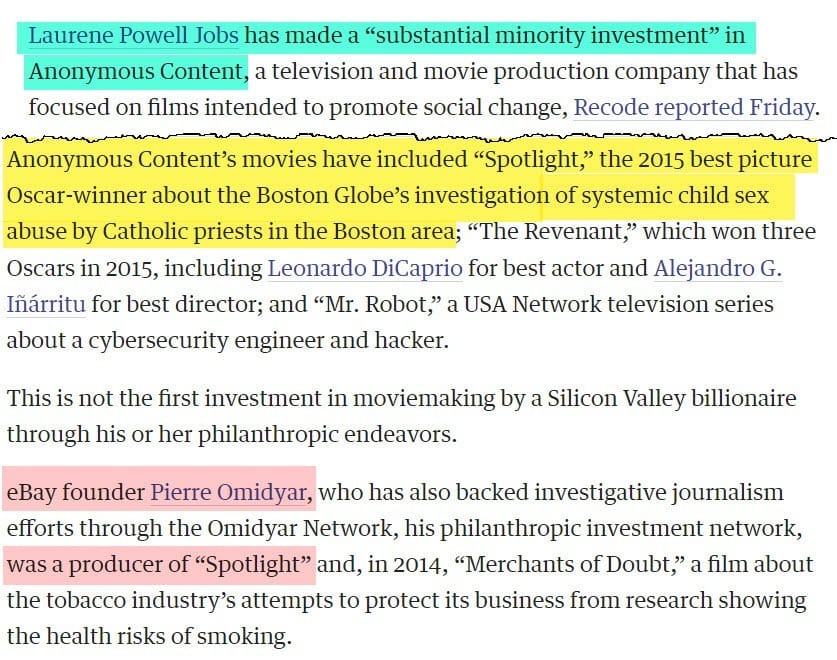
In fact, Whatever It Takes executive producers Jonathan Silberberg and Nicole Stott from Concordia Studio both worked directly with Omidyar's Luminate Media in 2020 to produce A THOUSAND CUTS - a documentary about the CEO/Founder of news site Rappler, Maria Ressa, and the fight for press freedom in the Philippines.


Strangely, the Omidyar Network website appears to have recently removed previous posts mentioning their financial involvement and support of the news site after the Philippine Securities and Exchange Commission revoked Rappler's certificates of incorporation and held that the issuance of Philippine Depositary Receipts (PDRs) to Omidyar Network were in violation of the country's Constitution.
Omidyar's public positions on free speech and press freedom may strike some as particularly ironic, given the obvious correlations and implications raised in the cyberstalking case, with one judge going so far as to say the actions undertaken by eBay security personnel were "abhorrent to First Amendment values."
Engaging with a production team that has ties to Omidyar-backed projects/ organizations could raise questions about conflicts of interest or bias and seemed like an odd choice, given the traumatic experiences of the victims and ongoing litigation involved, though it's not clear if the film was in any way related to the Steiners' decision to part ways with their former attorney.
Either way, any potential settlement or judgement will now have fees and costs for Ms. Scapicchio withheld and the Steiners' current counsel will likely receive a significant portion as well, cutting even further into what will be paid out to the actual victims of the crimes - making the issue of punitive damages a crucial sticking point for both sides in this case.
The court has not responded to eBay's Motion to Certify Interlocutory Appeal at time of publishing.


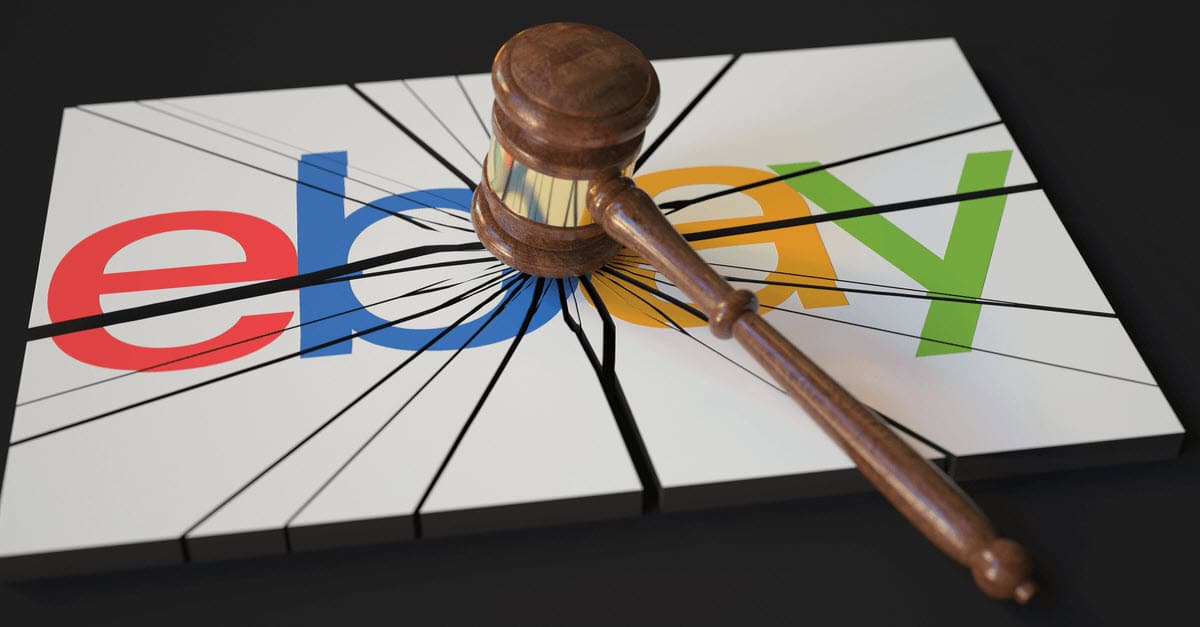









 cwi
cwi












